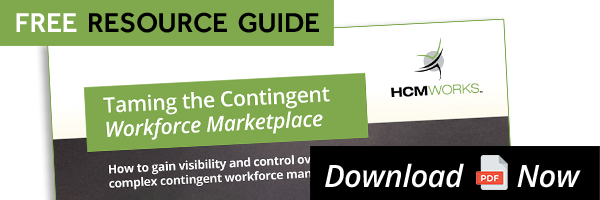Today’s business landscape has changed dramatically from that of 10 years ago. Large organizations now rely on a broad pool of vendors to supply the assets they need if they are to continue to meet the demands of their clients and grow.
These vendors likely supply the large majority of assets for your company, whether it be internal workers, your IT infrastructure, contingent workers, office furniture and even the stationary that you use.
So, how exactly do you keep up with these vendors and successfully manage their relationships to ensure you are getting the best return on investment (ROI) for the money you spend?
This is a major issue for most organizations when it comes to their contingent workforce, with many companies still struggling to develop strategic ways that unify the management of non-temporary workers.
The inability to manage this now essential workforce could leave your company falling behind competitors when it comes to hiring top talent and driving business growth. That’s why an outsourced managed services provider (MSP) is essential for the future of your organization.
What is an MSP?
A managed services provider is an external, outsourced company that handles various processes and functions on behalf of a company in a bid to improve operational efficiency and cut costs.
By creating specific programs that make the core competencies of your business more efficient, a successful MSP will operate as an external arm of your company helping to drive growth and aid the success of your organization.
MSPs offer services in a wide range of areas within your business, including:
- Contingent workforce management
- IT
- Internal workforce management
- Payroll
- Human resources (HR)
- Vendor management
- Procurement and sourcing
- And much more
Why is an MSP important for your company’s contingent workforce management?
Just like you know how many benefits will come with the use of the ever-expanding contingent workforce, you’ll also know just how complex contingent workforce management is and how many mistakes can be made along the way.
Due to these complexities, many company’s contingent workforce management programs are fragmented. The majority of companies suffer from having no company-wide approach, with HR and procurement professionals left confused over how to engage, manage and organize contingent workers.
Outsourcing this aspect of your business to an MSP, however, will give your organization access to the resources and expertise needed to successfully manage your contingent workforce.
An MSP with expertise in contingent workforce management, such as HCMWorks, will have expert knowledge in a range of contingent workforce areas - such as talent acquisition, compliance, onboarding, payment, and the technology needed to implement strategic management processes.
What benefits will an MSP bring to your company’s contingent workforce strategy?
An MSP will be able to develop a centralized management strategy for your company’s contingent workforce management, meaning your entire company will be on the same page when it comes to the entire lifespan of contingent workers.
This will come with a wide range of benefits for your company, including:
Access to a vendor management system: Technology is changing the business world, and it’s pretty much impossible to manage a contingent workforce without it. An MSP will ensure you have access to a vendor management system (VMS), that supports sourcing, acquisition, management and payment of your on-demand workforce - and unifies this information in one centralized database. Look for a technology-neutral MSP for even more bang for your buck.
Improved visibility and control: Transparency into your contingency workers is crucial for the efficiency and productivity of your contingent workforce strategy. Improved visibility and control will give you access to data to improve your hiring decisions, cut costs, improve the efficiency of workers, ensure you are hitting key performance indicators (KPIs) and much more.
Cut costs: A managed service provider will save you money on a large range of aspects associated with your contingent workforce management strategy, including cheaper but more talented workers, give you access to more competitive vendor rates, freeing HR and procurement staff up to focus on more valuable tasks for your organization and much more.
Better talent acquisition: By improving your talent pool to draw from, as well as improving your company’s image among non-permanent workers, an experienced MSP will make sure that your company is able to quickly, strategically and cost-effectively acquire top talent before your industry competitors.
Automated processes that prevent administrative errors: By developing a successful contingent workforce management strategy that makes use of a world-class VMS, an MSP can significantly automate the work done by your HR and procurement departments. This not only cuts down on those manual administrative errors, but it also frees these teams up to focus on your core business and drive growth.
Want to learn more about the benefits of a managed service provider, and how HCMWorks can design a contingent workforce management program that will transform how your organization operates? Contact our team of experts today for more information.



